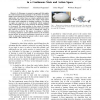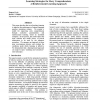286 search results - page 6 / 58 » Using inaccurate models in reinforcement learning |
IROS
2007
IEEE
14 years 2 months ago
2007
IEEE
— In this paper, we present an approach that applies the reinforcement learning principle to the problem of learning height control policies for aerial blimps. In contrast to pre...
ECML
2003
Springer
14 years 27 days ago
2003
Springer
Due to the unavoidable fact that a robot’s sensors will be limited in some manner, it is entirely possible that it can find itself unable to distinguish between differing state...
GECCO
2009
Springer
14 years 2 months ago
2009
Springer
Helicopter hovering is an important challenge problem in the field of reinforcement learning. This paper considers several neuroevolutionary approaches to discovering robust cont...
ICML
2005
IEEE
14 years 8 months ago
2005
IEEE
This paper describes the use of machine learning to improve the performance of natural language question answering systems. We present a model for improving story comprehension th...
ICRA
2010
IEEE
13 years 6 months ago
2010
IEEE
Abstract— Reinforcement learning algorithms have been successfully applied in robotics to learn how to solve tasks based on reward signals obtained during task execution. These r...


